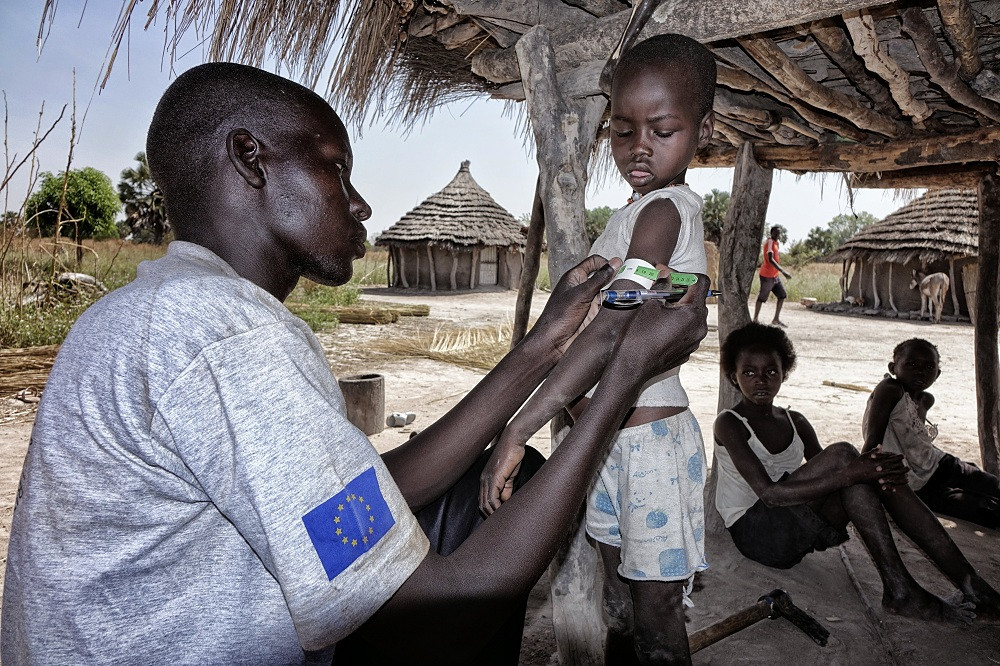We are fighting malnutrition in South Sudan with gardens, ploughs and market support
Published: Jun 25, 2015 Reading time: 4 minutes Share: Share an articleAlthough malnutrition is caused by a number of factors, it cannot be effectively addressed without improved nutrition for children and adults. This is exactly what aim for since last September in collaboration with our partner organization Cesvi, a member of Alliance2015, operating in South Sudan’s Northern Bahr el Ghazal province within a project financed by the European Union.

„In the region, we are improving food self-sufficiency and nutrition of six thousand endangered families, out of which a thousand families from forty villages will continue receiving our assistance until November next year, so that we achieve the greatest possible health improvement,“ says Pavel Muroň, the programme coordinator in South Sudan.
Growing vegetables will enrich diet and increase family income
Men, women, and children will gradually get involved in a range of activities with nutrition as the common denominator. Thanks to various training opportunities, people will learn how to increase the yield of their fields and what kinds of vegetables to grow in order to enrich their families’ diet. Training sessions focusing on the health of children under the age of five will teach mothers how to strengthen children’s hygiene habits and childcare.
#~gallery-1321~#
For the training of small-scale farmers, for whom agricultural production often presents the only source of livelihood, People in Need established twenty-five farming and fifteen pastoralist schools in November 2014, where trained staff provide practical training to a thousand Sudanese families, covering all aspects of plant and livestock production.
„At farming schools, people learn everything they need, from growing vegetables to vegetable processing, sale, and consumption. At pastoralist schools, local people are educated in animal behaviour, care, meat cutting, and cooking,“ says Pavel Muroň, adding that the course participants not only benefit from an enriched diet, but also from a higher family income. „At the farming school, they are currently harvesting tomatoes, onions, cabbage, pumpkins, spinach, and other crops. Vegetables have notably enriched the families’ otherwise meagre diet, while also significantly increasing their income up to two hundred dollars, which is a great sum of money by local standards,” Pavel Muroň adds.
Ploughing training and equipment for fishermen
Ox-plough training is one of the most successful activities. Due to years of armed conflict, the Sudanese have forgotten this formerly very widespread technique. „Before the war, draught animals were commonly used for ploughing, but after the war ended there were only a few people who owned a plough and knew how to use it,” says James Mathiang, the head of the programme, adding that thanks to ploughs, people will be able profit from larger areas of soil than before. So far, People in Need staff have taught ploughing skills to seventy-two farmers, who have lent their oxen for training and are eagerly awaiting the delivery of their own plough. They will gradually repay the plough with funds earned from lending it to neighbours and other farmers.
 The health of draught and other domestic animals is ensured by forty staff from the local veterinary administration, which has received training from People in Need as well as motorcycles and bicycles to facilitate their transportation in remote rural areas of South Sudan. Thanks to this, these workers managed to vaccinate thirty thousand cows and twenty thousand goats and sheep, while treating 5500 animals with various problems in the course of eight weeks.
The health of draught and other domestic animals is ensured by forty staff from the local veterinary administration, which has received training from People in Need as well as motorcycles and bicycles to facilitate their transportation in remote rural areas of South Sudan. Thanks to this, these workers managed to vaccinate thirty thousand cows and twenty thousand goats and sheep, while treating 5500 animals with various problems in the course of eight weeks.
As Pavel Muroň mentioned, even the fishermen were not forgotten. The three hundred poorest fishermen received equipment from People in Need, thus increasing several-fold their catches and hence their earnings.
Supporting the agricultural equipment market
The activities of the two-year RAIN project (Resilient Agriculture for Improved Nutrition), financed by the European Commission, are not only limited to farmers and primary production. „Our goal is to encourage the development of a market with agricultural and veterinary equipment and thus facilitate people’s access to necessary tools and seeds,” says Muroň. „We are therefore currently choosing retailers that we will connect to wholesalers with the needed equipment. At the same time, we will organize a massive publicity campaign in support of these businesses,“ he adds.
In the coming months, a range of other activities is planned. For example, a programme to improve flood protection and water reservoir construction will begin, as well as a campaign promoting good hygiene practices and childcare.
